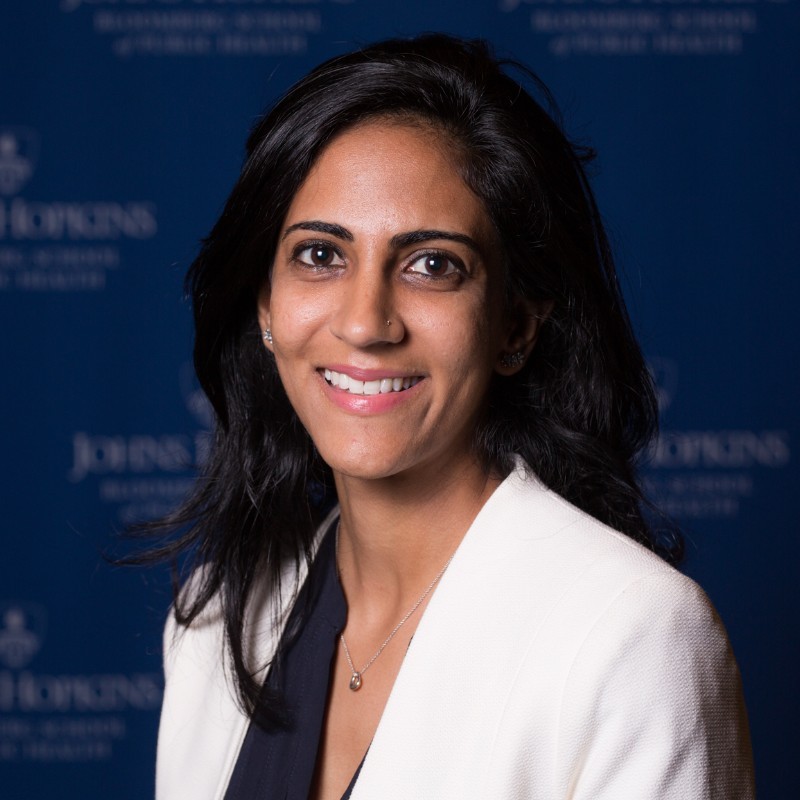Student Profile: Safia Jiwani

Safia Jiwani, MSPH ’16, is a third year PhD student in the Department of International Health’s Global Disease Epidemiology and Control program. Her research centers around enhancing the measurement of maternal and newborn health in low- and middle-income countries, focusing on effective coverage, quality of care, and health disparities.
For her doctoral dissertation, Safia is leading a multi-country mixed methods study evaluating the quality of maternal and newborn health services in urban low-income neighborhoods and informal settlements in Nairobi, Lusaka, and Ouagadougou. “This has been the most exciting project I have been involved in at Johns Hopkins,” she says. “I had the opportunity to design the study, develop the tools, oversee data collection in the field, and work in close collaboration with local research institutions at each site.” She hopes that her research will help inform policies and drive action towards improving quality of maternal and newborn care in complex urban poor settings.
In recognition of her exceptional research Safia has earned various awards including the Nancy Stephens Award from the Department of International Health and is one of the 2023 recipients of the Arole-Taylor Underserved Community Health Fellowship Award that supports students conducting research in underserved communities to advance community health and empower populations.
Before coming to the Bloomberg School of Public Health for her master’s and doctoral degrees, she engaged in nutrition research in low-income communities of Peru with the Instituto de Investigacion Nutricional. Afterwards, she returned to her home country of Burundi, where she grew up during the civil war, and managed a health and nutrition program with the International Medical Corps targeting the reintegration of returnee populations who had fled to Tanzania as refugees and returned to Burundi decades later. Furthermore, Safia played a pivotal role in establishing a pharmaceutical supply chain program aimed at bolstering health system capacity in low-resource regions of Burundi.
As a master’s degree student, Safia established herself as a skilled researcher and assumed various roles within and beyond the academic sphere. Noteworthy contributions include her work in the Department’s Health Systems program evaluating the impact of a nurse mentoring and training program in Bihar, India, and her tenure as an international consultant with the Pan American Health Organization where she developed a monitoring framework for the Sustainable Development Goals and published on late maternal mortality in the Americas region. Following her master’s, Safia trained at the Center of Excellence in Chronic Disease Research at the Universidad Peruana Cayetano Heredia in Peru where she spearheaded a multi-country analysis assessing socioeconomic inequalities in the obesity epidemic in Latin America and the Caribbean.
Upon returning to the Bloomberg School as a research associate, Safia worked at the Institute for International Programs where she was a program coordinator for COMSA, a nationwide mortality surveillance project in Mozambique. Safia also joined the Countdown to 2030 consortium where she led various analyses and capacity strengthening workshops focusing on measuring inequalities in reproductive, maternal, newborn, child, and adolescent health and nutrition in sub-Saharan Africa. Safia continues her involvement with the Countdown to 2030 Data and Analysis Center for Effective Coverage as a PhD student.
Safia is committed to working to improve the measurement of maternal and newborn health indicators and aspires to inform actionable strategies to strengthen health systems and improve health outcomes among vulnerable and hard-to-reach populations, while addressing health inequalities. Drawing upon her many roles as a student, researcher, academic advisor, and advocate within the Department and at the Bloomberg School, Safia says her best advice to students is to “get involved in projects outside of the classroom, meet other students and faculty outside your program—the global network you can build while at Johns Hopkins is unmatched!”
Published November 16, 2023.
